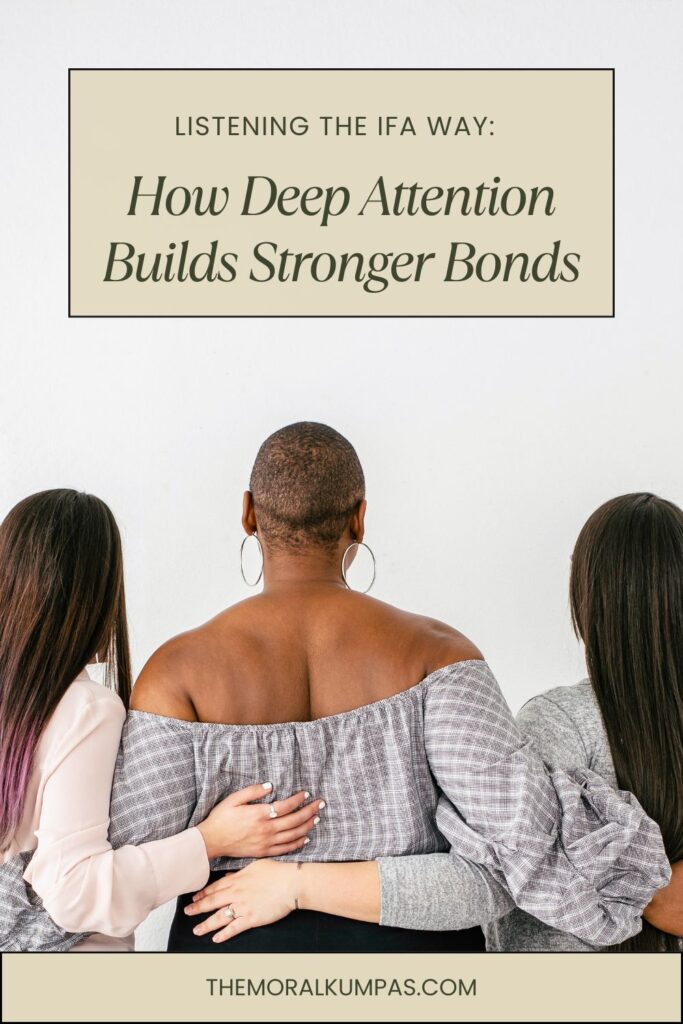Listening the Ifa Way: How Deep Attention Builds Stronger Bonds

In our noisy, fast-paced world, truly listening to someone is rare—and powerful. In the philosophy of Ifa, listening is not just hearing words. It’s a form of alignment, presence, and connection. This post explores the wisdom of Ifa and active listening, showing how intentional attention strengthens family ties, improves communication, and helps us respond with clarity instead of conflict.
What Ifa Teaches About Listening
In Ifa, communication is sacred. Words carry power (ọ̀rọ̀), but their meaning depends on context—and the listener’s ability to truly understand. Orunmila, the Orisha of wisdom, is often praised not only for what he knows, but for how attentively he listens before offering insight.
Active listening, in this light, is a demonstration of wisdom and character. You can’t lead or love without it.
Before you read on…
Sign up for your free weekly flow newsletter. I’m giving you a sneak peak into my exact strategy into how to achieve your goals easily step-by-step and week by week. Ready to level up in every area of your life?
Why We Struggle to Listen (And What It Costs Us)
Most of us listen to respond—not to understand. That habit leads to:
- Misunderstandings
- Emotional disconnection
- Escalated arguments
- Children or partners who feel ignored
Ifa teaches that iwarere—good character—shows itself in how we pause, observe, and make space for others to express their truth.
The Ifa and Active Listening Checklist
Want to apply Ifa and active listening at home or work?
Use this guide:
- Be Present with Intention
Put down your phone, face the person, and make eye contact. Presence is the first sign of respect. - Resist the Urge to Interrupt
Wait until the person finishes. Let silence exist. Wisdom grows in pauses, not reactions. - Reflect What You Heard
Say: “What I’m hearing is…” or “Do you mean…?” This shows care and clears up confusion. - Listen Beyond the Words
Notice tone, body language, and emotional cues. Ifa reminds us that the truth is layered, and we must observe with full awareness. - Ask Questions, Not Accusations
Open-ended questions invite dialogue. Avoid blame. Stay curious.
Real-Life Examples:
- A parent stops correcting mid-sentence and asks, “What happened from your point of view?” The child feels heard—and opens up.
- A spouse listens quietly, without offering quick advice. Later, they’re thanked: “I just needed someone to hear me.”
- At work, a colleague uses silence to let a team member finish their idea. The result? A breakthrough solution.
Small shifts in listening lead to big shifts in trust.
Why This Matters in Families
In homes, listening builds a foundation of emotional safety. Children raised with attentive listening are more confident and expressive. Partners who feel heard argue less, support more. Parents who practice active listening model respect—and in turn, receive it.
Ifa teaches us that character is not shown in moments of ease, but in how we respond during moments of tension.
Reflection Questions:
- When someone talks to you, are you really listening—or mentally preparing your reply?
- Do you give others the kind of attention you wish to receive?
- Can you practice one moment of “listening stillness” today?
Final Thoughts: The Gentle Strength of Listening
Listening is more than a skill—it’s a practice of patience, humility, and presence. It doesn’t require spiritual initiation or ritual. Just intention.
In a world filled with noise, be someone who listens like Orunmila—quietly, fully, and with compassion.
Strengthen how you speak and connect — with yourself, your goals, and the people who matter most.
Explore more Ifá-inspired insights in the Connection & Speech (Ọ̀rọ̀) Library
What’s Next?
Now that you’ve got these strategies, it’s time to implement them to make life easier, to achieve your goals with a much clearer strategy without stressing and running in circles. Want a weekly step-by-step roadmap to your ideal lifestyle?
Access the weekly flow membership.
I’m giving you a heads up and exact way to navigate your: relationships/love, career/finances, and mindset shifts to gain more clarity, structure, and consistency. Ready to level up?


